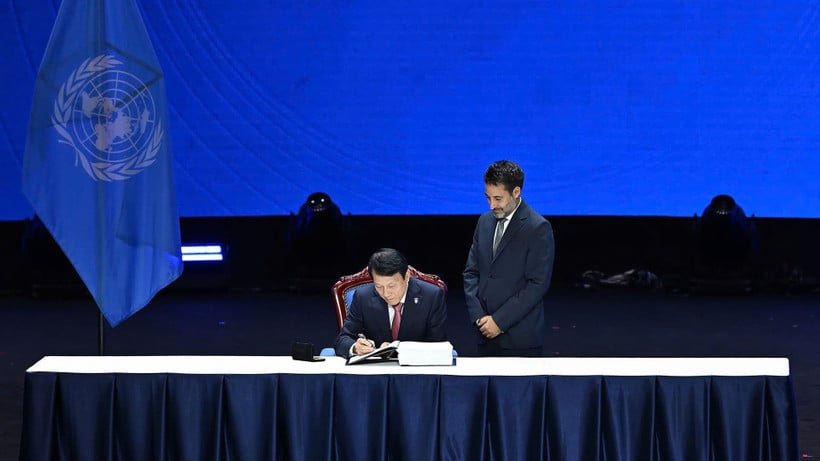
Minister of Public Security Luong Tam Quang signs the United Nations Convention against Cybercrime. (Photo: THUY NGUYEN)
Never before has the line between "protecting security" and "ensuring freedom" been so blurred. Cyberspace – where people connect, communicate, and create – is gradually becoming a new "living space" for humanity, but also a "battleground" for invisible conflicts over information, data, and control.
The Hanoi Convention is therefore not only an international legal document, but also a powerful message about human rights , ethics, and the global digital order, reflecting the aspiration to build a safe, humane, and fair cyberspace – where technology serves people, not dominates them.
The foundation of the digital order
Cybersecurity is not just about protecting devices, systems, or digital data; more broadly, it's about protecting national sovereignty , economic security, cultural identity, and human identity in the digital environment.
In the context of rapid digital transformation, all aspects of life – from government administration, the economy , education, healthcare to media – rely on technology. Therefore, cybersecurity has become a "shield" protecting the order, stability, and sustainable development of the nation in the digital space.
Looking back at cybersecurity and human rights in the digital age, the Hanoi Convention is not just a reminder of a legal milestone, but also a declaration by Vietnam to the world about its humane, proactive, and responsible approach to cyberspace governance. In a context where technology is expanding human rights but simultaneously making them more fragile than ever, the Hanoi Convention emerges as an inevitable step – aiming to establish a new digital order based on the principles of respect for human rights, digital sovereignty, and the common security of the international community.
The Hanoi Convention – with its spirit of international cooperation on cyberspace – has contributed to shaping a new set of international standards for data protection, information security, and combating transnational cybercrime. The Convention affirms the shared responsibility of nations, international organizations, technology corporations, and users alike in building a “safe, transparent, and people-centered cyberspace.”
Specifically, the Hanoi Convention emphasizes three fundamental pillars: (i) Data security and information authentication: All systems and organizations are responsible for ensuring the integrity and security of personal information, preventing the misuse of data for commercial or political purposes. (ii) Transnational cybercrime prevention and control: Promoting international cooperation in the investigation, prosecution, and sharing of cyber intelligence to effectively address cross-border violations. (iii) Responsibility of technology actors and governments: Establishing the principle of “dual responsibility” – both promoting innovation and ensuring that the legitimate rights and interests of citizens in cyberspace are not harmed.
In particular, the Party's policy is: Promoting digital transformation while ensuring security and safety is an objective necessity for Vietnam to make breakthroughs in the new era. The Party's 13th National Congress documents clearly stated: We must proactively adapt to the Fourth Industrial Revolution, build a digital economy and a digital society, while simultaneously ensuring cybersecurity as a prerequisite for national digital sovereignty.
Cybersecurity is the foundation of the digital order – where technology not only serves development, but also serves humanity, human rights, and social stability. Therefore, ensuring cybersecurity is not a "barrier" to freedom, but rather a condition for freedom to be exercised safely, responsibly, and sustainably.
Human rights - the central standard of digital transformation.
In recent years, privacy violations, excessive surveillance, and the misuse of facial recognition technology and user behavior data analysis have become global issues.
The development of artificial intelligence (AI) and content recommendation algorithms has created the ability to influence users' thinking, beliefs, and even emotions.
The online space – which was once expected to be an environment of freedom and equality – is becoming a "mirror reflecting" both the bright and dark sides of humanity, where a single malicious comment or piece of misinformation can destroy a person's honor, dignity, and life.
More alarmingly, phenomena such as fake news, hate speech, and cyberbullying have been seriously violating human rights, especially those of vulnerable groups such as women, children, people with disabilities, and ethnic minorities. In the digital environment, victims often lack effective self-protection mechanisms, while technology platforms prioritize business profits and traffic over social responsibility.
This situation necessitates a global legal framework and ethical standards in cyberspace. This humanistic philosophy is entirely consistent with the views of President Ho Chi Minh, who always placed people at the center of all policies.
From the very beginning of the nation's founding, President Ho Chi Minh affirmed: An independent nation whose people do not enjoy freedom and happiness is meaningless. He always considered human rights to be a sacred value, the foundation of all political and legal institutions.
The first constitution in our nation's history, drafted by him as the head of the drafting committee, was adopted by the National Assembly on November 9, 1946, which stipulated that: Guaranteeing the democratic freedoms of the people is one of the fundamental principles of the Constitution.
That ideology has served as a guiding light for the constitutional, legislative, and governance processes of the nation for nearly 80 years. Today, that spirit is continued and elevated in the Hanoi Convention, as Vietnam, together with the international community, affirms a new truth in the digital age: Protecting cybersecurity must go hand in hand with protecting human rights.
Thus, looking from Ho Chi Minh's ideology to the spirit of the Hanoi Convention today, we can see a unity in the perspective of human development – for humanity – and by humanity. Human rights in the digital age can only be guaranteed when technology is guided by ethics, law, and compassion. Only then will digital transformation truly have a humanistic meaning, and cyberspace become an environment for human development, not a place where humans become products of technology.
Creating new values in cyberspace.
In the vibrant flow of the digital age, Vietnam has emerged not only as an actively integrating nation but also as a creator of new values in cybersecurity governance. From the enactment of the Cybersecurity Law in 2018 and the Personal Data Protection Law in 2024, to the implementation of the National Digital Transformation Strategy to 2030, with a vision to 2045, Vietnam is gradually building a unified, modern, and humane legal framework to ensure both core values: national security and human rights in the digital environment.
Ensuring human rights is always linked to national interests, based on the principle: Security is a condition for freedom, and freedom is the measure of security. Recognizing the role of human rights in the Vietnamese revolution, and inheriting President Ho Chi Minh's human rights ideology, our Party has always affirmed: Everything is for the people, everything is for freedom, happiness, and the rich and comprehensive development of each individual in a harmonious relationship between the individual and the community, between society and nature.
This perspective is both philosophically humanistic and reflects the practical realities of sustainable development in the technological era. The Party's policy is: Promoting digital transformation while ensuring security and safety is an objective necessity for Vietnam to break through in the new era, demonstrating a profound understanding that true freedom is impossible in a cyberspace full of risks, chaos, and lawlessness.
In terms of building and perfecting institutions and laws, the Party and the State have continuously issued guidelines and policies aimed at promoting socialist democracy and ensuring the exercise of the people's right to self-governance.
Human rights, fundamental rights and obligations of citizens are more clearly defined in the 2013 Constitution and further specified in legal documents, from the Law on Access to Information, the Law on Children, the Law on Gender Equality, to new regulations on personal data protection and cybersecurity, in line with the development requirements of the digital age and Vietnam's international commitments.
In this process, Vietnam not only protects its own interests but also makes a responsible contribution to the global cyber order. Vietnam's proposal and promotion of the "Hanoi Convention" on cybersecurity and human rights is a step forward of regional and international significance, demonstrating the pioneering role of a developing nation with strategic thinking and the capacity to coordinate new international standards.
The "Hanoi Convention" is seen as an effort to build a framework for international cooperation towards a green, clean, and humane cyberspace, where technology serves humanity and promotes transparency, trust, and fairness.
The Party's policy is: Promoting digital transformation while ensuring security and safety is an objective necessity for Vietnam to break through in the new era. The Party's 13th National Congress documents clearly stated: we must proactively adapt to the Fourth Industrial Revolution, build a digital economy and a digital society, while simultaneously ensuring cybersecurity as a prerequisite for national digital sovereignty. Cybersecurity is the foundation of the digital order – where technology not only serves development but also serves people, human rights, and social stability. Therefore, ensuring cybersecurity is not a "barrier" to freedom, but rather a condition for freedom to be exercised safely, responsibly, and sustainably.
Looking back at cybersecurity and human rights in the digital age, the Hanoi Convention is not just a reminder of a legal milestone, but also a declaration by Vietnam to the world about its humane, proactive, and responsible approach to cyberspace governance. In a context where technology is expanding human rights but simultaneously making them more fragile than ever, the Hanoi Convention emerges as an inevitable step – aiming to establish a new digital order based on the principles of respect for human rights, digital sovereignty, and the common security of the international community.
With a vision that digital transformation must go hand in hand with a transformation of mindset, and technological development must be linked to human development, Vietnam has been demonstrating its capacity to create standards, coordinate values, and balance global interests in this new and complex field.
From the principle of "all for the people" to its concretization through legal systems, policies, and international cooperation initiatives, Vietnam not only protects national interests but also contributes to shaping an Asian-Vietnamese approach to digital human rights, where people are placed at the center of development, and technology is a tool to serve freedom and happiness.
The Hanoi Convention, therefore, not only has international legal significance but also reflects the ideological stature, character, and aspirations of a Vietnam deeply integrated, sustainably developed, and globally responsible.
In a rapidly changing world order, maintaining a balance between cybersecurity and human rights is essential to upholding the integrity of an independent, sovereign, civilized, and humane nation. This is the path that the Party, State, and people of Vietnam are steadfastly pursuing – the path of placing people at the center of progress and using progress to serve people.
TRAN TUAN THIEN
Source: https://nhandan.vn/cong-uoc-ha-noi-dau-moc-toan-cau-ve-an-ninh-mang-va-quyen-con-nguoi-post918275.html




![[Photo] Prime Minister Pham Minh Chinh holds a phone call with the CEO of Russia's Rosatom Corporation.](/_next/image?url=https%3A%2F%2Fvphoto.vietnam.vn%2Fthumb%2F1200x675%2Fvietnam%2Fresource%2FIMAGE%2F2025%2F12%2F11%2F1765464552365_dsc-5295-jpg.webp&w=3840&q=75)


![[Photo] Closing Ceremony of the 10th Session of the 15th National Assembly](/_next/image?url=https%3A%2F%2Fvphoto.vietnam.vn%2Fthumb%2F1200x675%2Fvietnam%2Fresource%2FIMAGE%2F2025%2F12%2F11%2F1765448959967_image-1437-jpg.webp&w=3840&q=75)
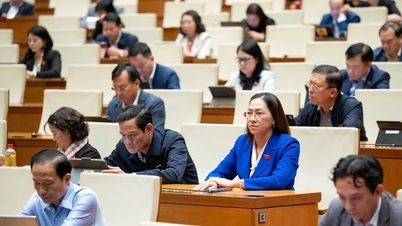

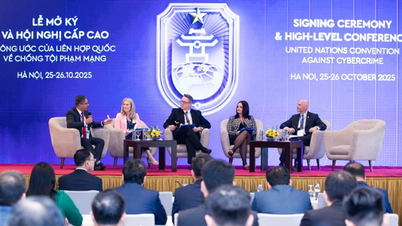
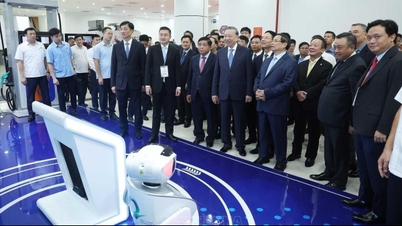

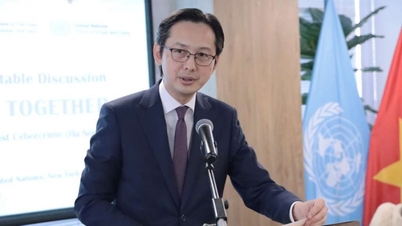


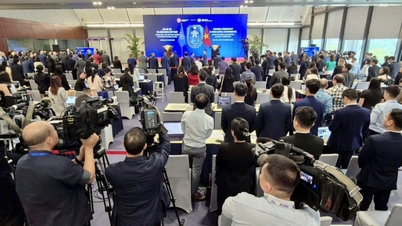
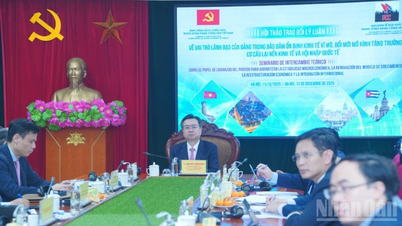
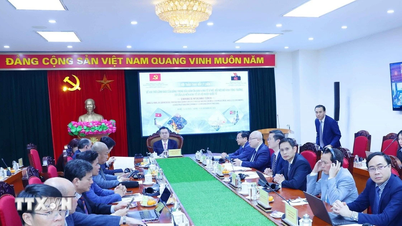

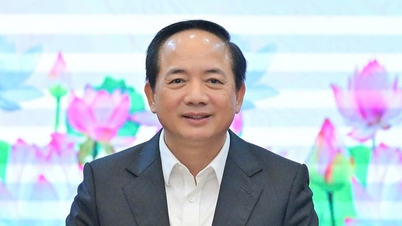

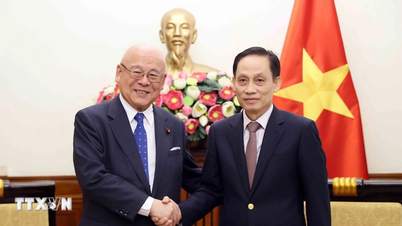
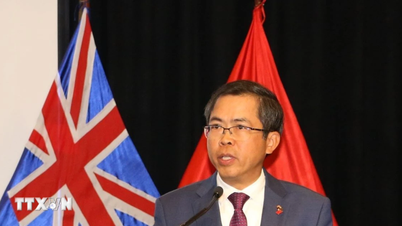





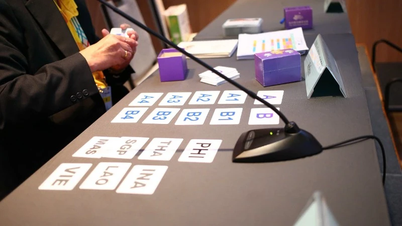
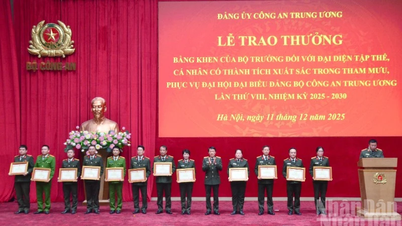
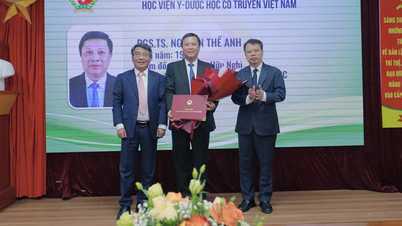

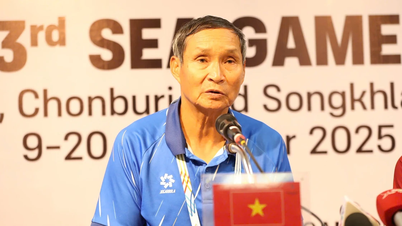






















![[OFFICIAL] MISA GROUP ANNOUNCES ITS PIONEERING BRAND POSITIONING IN BUILDING AGENTIC AI FOR BUSINESSES, HOUSEHOLDS, AND THE GOVERNMENT](https://vphoto.vietnam.vn/thumb/402x226/vietnam/resource/IMAGE/2025/12/11/1765444754256_agentic-ai_postfb-scaled.png)




















































Comment (0)